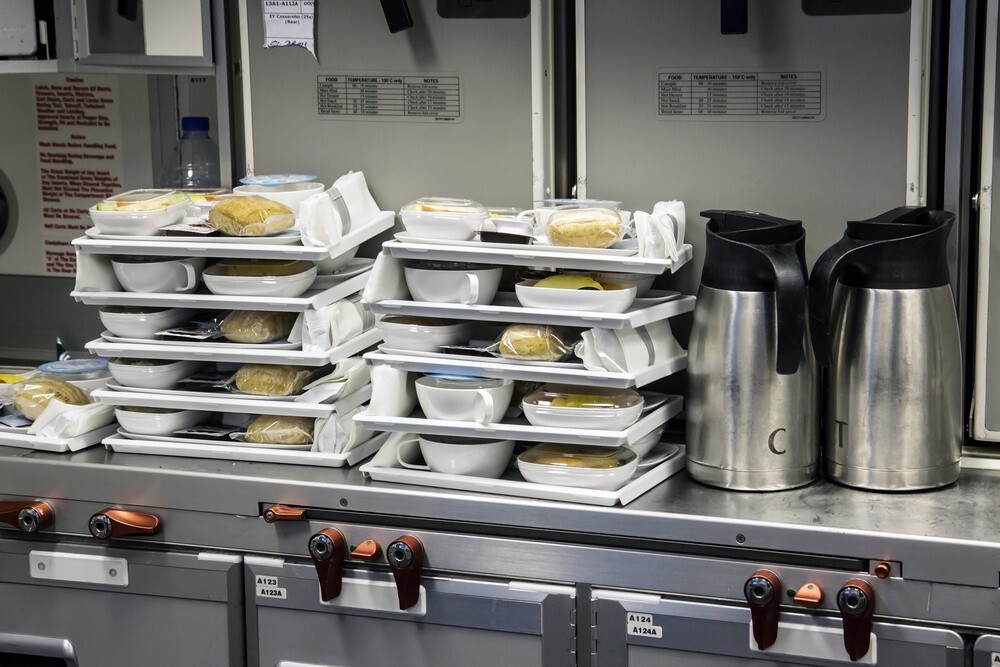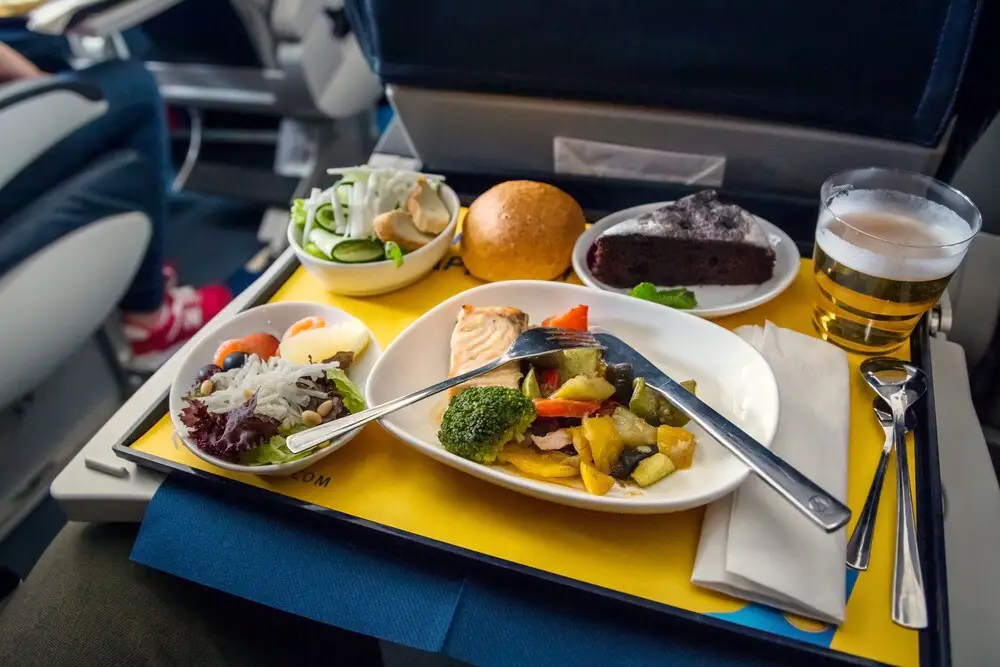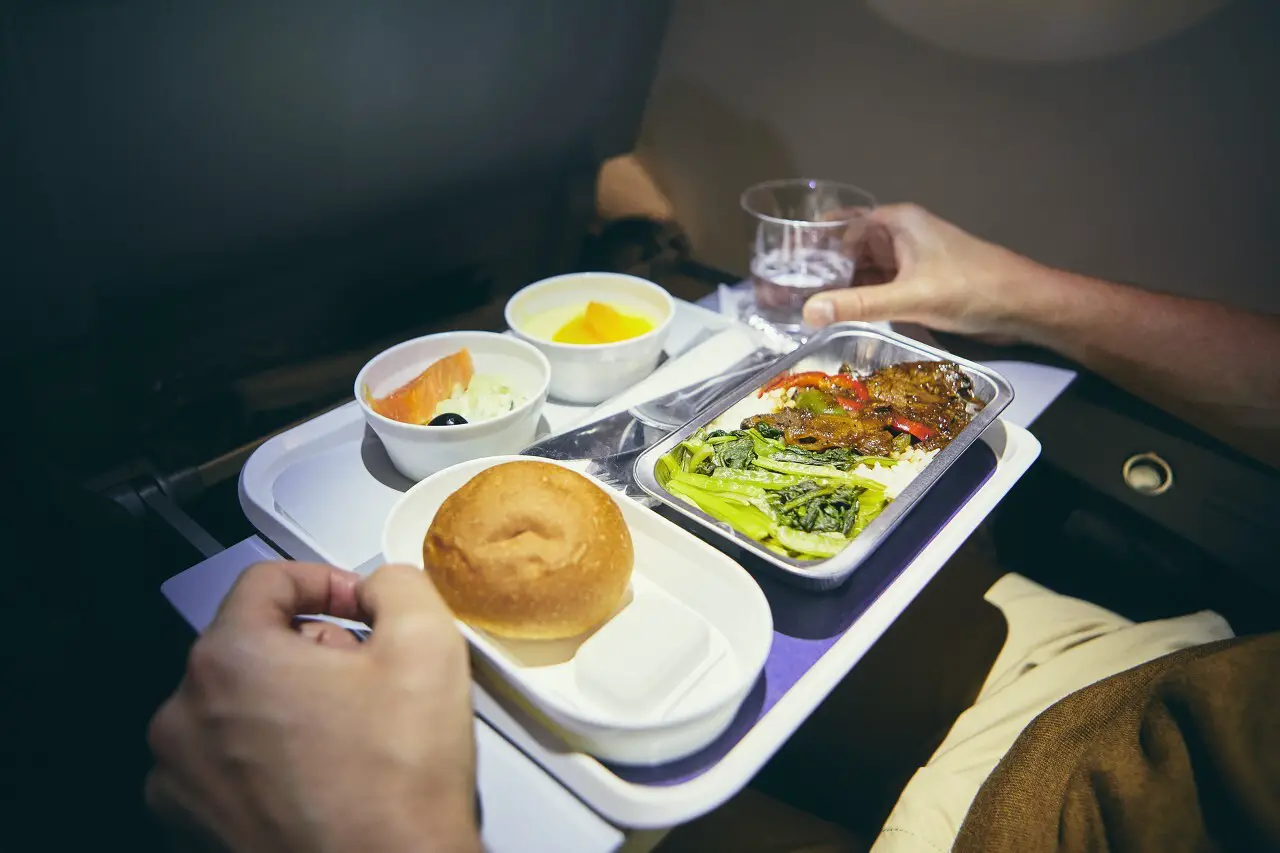We’ve all been there. Bored, uncomfortable, squashed and irritable while on a long flight. The only saving grace to break the boredom, like a lazy Sunday at home, is meal time!
You finally get your “chicken or beef”, only to be sorely disappointed by the bland taste, lack of aroma and poor quality of your food.
Then you think to yourself, I have paid so much for this flight, the least they can do is give me some decent food! Why do they always skimp out on something that can make such a difference to your experience?
The Answer May Surprise you
The answer could be more of a “It’s not you, it’s me” scenario. See, when you enter an airplane, especially when you are at high altitudes, there are a lot of factors that can manipulate your taste buds.
Our interpretation of flavor comes from a combination of taste and smell. When you enter a pressurized cabin in an airplane, it affects and controls both of these senses which make our perception of saltiness and sweetness less prominent.
On top of this, there are a load of factors that contributes to the dampening of your taste abilities. Some of these include lower air pressure, lack of humidity, and the background noise.

Lack of Humidity and Pressure
When you step on an airplane, the atmosphere created inside the cabin affects your olfactory (smell) sense first. Then, as the plane ascends, the air pressure drops while humidity levels in the cabin drop drastically. At about 30,000 feet (9,144m), humidity is less than 14% which is akin to the humidity of most deserts.
According to a 2010 study conducted by Germany’s Fraunhofer Institute for Building Physics, commissioned by German airline Lufthansa, the combination of the lack of humidity and low pressure reduces the the ability of your taste buds to detect sweet and salty foods by around 30%.
Up to 78% of what people think is taste, is in fact smell. We need evaporating nasal mucus to smell, but in the dry cabin air our odor receptors do not work properly, and the effect is that this makes food taste twice as bland.

Can Ears Affect Our Taste?
While you may think that flavor is influenced by your nose and mouth, scientists are now finding that your ears can also play a part. A study found that people eating to the sound of loud background noise rated food as being less salty and less sweet than those who ate in silence.
Moreover, a plane’s loud background noise of around 85db does not affect all tastes equally. For example, food with more sour and spicy flavors tend to be more prominent in the sky than salt or sugar.
Another interesting find! To those surrounded by loud noises, food seemed surprisingly more crunchier. Weird, I know. Seems there is a lot more to taste than meets the eyes (or mouth).
So is it All Because of Me?
While this seems to be more of a blame game on the way our sense work than the actual food itself. There are also other factors affecting airplane food. The fact that it has to be mass produced and be served in such a way that can be stored for long periods, as well as being space conscious play big roles in how chefs prepare in-flight meals.
Also, to heat up food on-flight, for safety reasons, nearly all airlines use convection ovens, which blow hot, dry air over the food. Microwaves and open flames are not allowed, although the first induction ovens are now on the market. This can dry out the food and make it less desirable.
So no, its not all because of our senses and cabin conditions. But it definitely is a big part of it!

The Secret to Why Airplane Food Tastes so Bad20 July, 2021 – George BunterWe’ve all been there. Bored, uncomfortable, squashed and irritable while on a long flight. The only saving grace to break the boredom, like a lazy Sunday at home, is meal time!
You finally get your “chicken or beef”, only to be sorely disappointed by the bland taste, lack of aroma and poor quality of your food.
Then you think to yourself, I have paid so much for this flight, the least they can do is give me some decent food! Why do they always skimp out on something that can make such a difference to your experience?

The Answer May Surprise youThe answer could be more of a “It’s not you, it’s me” scenario. See, when you enter an airplane, especially when you are at high altitudes, there are a lot of factors that can manipulate your taste buds.
Our interpretation of flavor comes from a combination of taste and smell. When you enter a pressurized cabin in an airplane, it affects and controls both of these senses which make our perception of saltiness and sweetness less prominent.
On top of this, there are a load of factors that contributes to the dampening of your taste abilities. Some of these include lower air pressure, lack of humidity, and the background noise.
Lack of Humidity and PressureWhen you step on an airplane, the atmosphere created inside the cabin affects your olfactory (smell) sense first. Then, as the plane ascends, the air pressure drops while humidity levels in the cabin drop drastically. At about 30,000 feet (9,144m), humidity is less than 14% which is akin to the humidity of most deserts.
According to a 2010 study conducted by Germany’s Fraunhofer Institute for Building Physics, commissioned by German airline Lufthansa, the combination of the lack of humidity and low pressure reduces the the ability of your taste buds to detect sweet and salty foods by around 30%.
Up to 78% of what people think is taste, is in fact smell. We need evaporating nasal mucus to smell, but in the dry cabin air our odor receptors do not work properly, and the effect is that this makes food taste twice as bland.
Can Ears Affect Our Taste?While you may think that flavor is influenced by your nose and mouth, scientists are now finding that your ears can also play a part. A study found that people eating to the sound of loud background noise rated food as being less salty and less sweet than those who ate in silence.
Moreover, a plane’s loud background noise of around 85db does not affect all tastes equally. For example, food with more sour and spicy flavors tend to be more prominent in the sky than salt or sugar.
Another interesting find! To those surrounded by loud noises, food seemed surprisingly more crunchier. Weird, I know. Seems there is a lot more to taste than meets the eyes (or mouth).
What is the Solution?
Scientist and airlines are always trying new things to make life better and easier for both staff and more importantly customers, including their meals. They are experimenting with air-safe ovens to better heat up food in while on board. Some are trying different materials for plates and cutlery, seeing if they make any difference.
Meanwhile, before science finds a way, chefs are experimenting with particular foods and spices to deliver the right taste in the wrong conditions. For instance, tomato and barbeque based foods tend to feel the effects less than creamy or cheesy foods. Curries and lemon based flavors are more prominent than salty and sweet flavors.
Until this art is perfected, perhaps we should focus on the destination rather that the meal we use as a distraction to kill the boredom.
Other Interesting Facts
- What Were Albert Einstein’s Last Words?Albert Einstein is one of the most famous thinkers in history, but what were his last words?
- How many grapes does it take to make 1 bottle of wine?Ever wondered how many grapes it takes to make 1 glass of wine? Or a whole bottle of wine?
- The Spanish Flu didn’t originate in SpainAll though it contradicts the title, the Spanish Flu actually originated in…
Facts You May Not Know
- How Many Hairs Do You Lose a Day?Losing hair every day is a natural phenomenon that we all have to deal with. But how many hairs do we lose a day on average?
- 5 Ways to Tell if a Diamond is Real or Fake.There are lots of ways to fake a diamond. But there are easy ways to figure out if they are fake or not…
- How Long does a $1 Bill Last in Circulation?The average $1 bill gets passed through hands 720 times in it’s lifespan. How long do you think that lifespan is?
- Why Do We Get Goosebumps?You may think it is to protect you from the cold, but you would be wrong…
- There are 2 Countries Where You Cannot Buy Coca-ColaCan you guess which 2 countries don’t sell the biggest brand in the world? …








